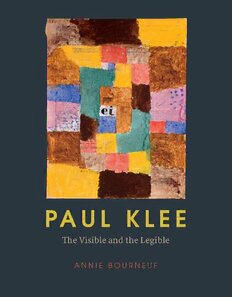
Paul Klee: The Visible and the Legible PDF
Preview Paul Klee: The Visible and the Legible
PAUL KLEE P A U L K L E E The Visible and the Legible A N N I E B O U R N E U F The University of Chicago Press Chicago and London Annie Bourneuf is assistant professor of art history at the School of the Art Institute of Chicago. The University of Chicago Press, Chicago 60637 The University of Chicago Press, Ltd., London © 2015 by The University of Chicago All rights reserved. Published 2015. Printed in China 24 23 22 21 20 19 18 17 16 15 1 2 3 4 5 ISBN- 13: 978- 0- 226- 09118- 1 (cloth) ISBN- 13: 978- 0- 226- 23360- 4 (e- book) DOI: 10.7208/chicago/9780226233604.001.0001 This publication is made possible in part by a grant from the Barr Ferree Foundation Fund for Publications, Department of Art and Archaeology, Princeton University. Library of Congress Cataloging-in-Publication Data Bourneuf, Annie, author. Paul Klee : the visible and the legible / Annie Bourneuf. pages cm Includes bibliographical references and index. ISBN 978-0-226-09118-1 (hardcover : alk. paper) — ISBN 978-0-226-23360-4 (e-book) 1. Klee, Paul, 1879–1940. 2. Art, Modern. I. Title. N6888.K55B68 2015 740.92—dc23 2014026786 This book has been printed on acid- free paper. For Ben Contents Acknowledgments ix A Note on Klee’s Sequential Numbering System xiii Introduction 1 1 The “Painter- Draftsman” 13 2 Seeing and Speculating 65 3 A Refuge for Script 141 Epilogue: Old Sound 183 Notes 187 Index 243 vii Acknowledgments My first and greatest debt of gratitude I owe to Brigid Doherty for her support, her criticism, and her example. An incomparable mentor, her thinking has inspired and guided me from the first in- klings I had of this project. Her questions and ideas have improved this book at every turn. Hal Foster shaped the aims of this book, and his encourage- ment and wisdom have sustained it. The incisive and detailed comments of Yve- Alain Bois made me see more clearly the book’s weaknesses and strengths. Bridget Alsdorf helped me to under- stand how this project’s metamorphosis into a book might be ac- complished. I owe special thanks to Charles W. Haxthausen, whose thinking on Klee has had a profound influence on this book and who could not have been a more welcoming and generous guide both to Klee and to Klee studies. I am grateful to Carol Armstrong for her criticism in the first stage of this project, and to Michael W. Jennings for his encour- ix agement and support. The book has benefited enormously from discussions over the years with Saul Anton, Gordon Hughes, and Joyce Tsai. And I am grateful as well to all who have read and criticized portions of my study, including Maureen Chun, Noam Elcott, Alex Kitnick, Jennifer King, and Michele Matteini. At
